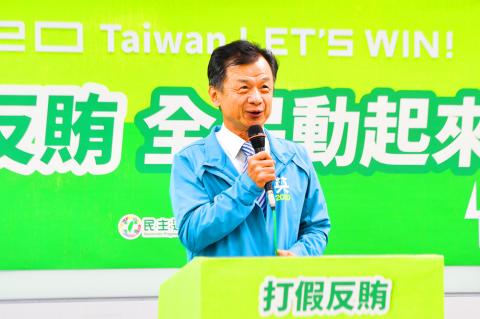Former minister of justice Chiu Tai-san (邱太三) was yesterday announced as head of a Democratic Progressive Party (DPP) task force to combat false news reports and vote-buying.
Taiwanese should report such incidents and the judicial authorities should crack down on them “to ensure we can have clean elections, thereby safeguarding the fruits of Taiwan’s democracy,” Chiu told a news briefing, at which he presented the lawyers and DPP lawmakers in the task force.
“Due to advances in technology, there are many more ways to buy votes and do so on a larger scale,” he said. “It is not enough to depend on law enforcement agencies; the whole of society must join the effort.”

Photo: CNA
“We do not want to see ‘black gold’ (黑金) people being voted into office, so they can enter the legislature and affect government policies,” Chiu said, using a phrase to refer to organized crime groups.
The slogans for all Taiwanese should be: “Refuse to take money, refuse to sell your vote,” and “Cut off the black gold flow of money,” he said.
Attorney Huang Di-ying (黃帝穎), who heads a DPP legal team, said that there are three main areas to focus on ahead of Jan. 11’s elections: fighting vote-buying, stamping out the spread of false news reports, and stopping infiltration by foreign forces, including meddling via financial influence.
People must be vigilant and report such offenses, Huang said.
Official statistics show that most vote-buying activity of the past decade was by Chinese Nationalist Party (KMT) members, he said.
The tally since the regulations governing illegal election activities were amended in November 2007 is 135 KMT candidates convicted on vote-buying charges, or nearly 81 percent of the total of 167, while fines for vote-buying issued to KMT members totaled NT$110.46 million (US$3.62 million), about 79 percent of the total, he said.
“The convicted KMT candidates came from all levels of government, contesting legislative, city and county councilor, township mayor, and village and borough warden seats,” Huang said. “It seems that the KMT is unable to win local seats without paying for votes.”
Illegal gambling can also influence election results with rigged odds and promises of big payouts, which encourage voters to place bets, then encourage their family and friends to vote for that candidate, he said.
“Police last month made arrests in such an operation, which had financial backing from China,” he said. “Eighteen people were detained and 75 computers were seized, while several hundred million New Taiwan dollars were reportedly bet on the results of local elections.”

A Taiwanese software developer has created a generative artificial intelligence (AI) model to help people use AI without exposing sensitive data, project head Huang Chung-hsiao (黃崇校) said yesterday. Huang, a 55-year-old coder leading a US-based team, said that concerns over data privacy and security in popular generative AIs such as ChatGPT and DeepSeek motivated him to develop a personal AI assistant named “Mei.” One of the biggest security flaws with cloud-based algorithms is that users are required to hand over personal information to access the service, giving developers the opportunity to mine user data, he said. For this reason, many government agencies and

The National Fire Agency on Thursday said a series of drills simulating a magnitude 8.5 earthquake would be held in September to enhance the government’s emergency response capabilities. Since earthquakes cannot be predicted, only by continuously promoting disaster prevention measures could Taiwan enhance its resilience to earthquakes, agency Director-General Hsiao Huan-chang (蕭煥章) said in a news release. The exercises would be held to mark annual National Disaster Prevention Day on Sept. 21, the aim of which is to test Taiwan’s preparedness and improve its earthquake resilience in case of a major temblor, Hsiao said. As part of those drills, an earthquake alert would

DEFENSE: The National Security Bureau promised to expand communication and intelligence cooperation with global partners and enhance its strategic analytical skills China has not only increased military exercises and “gray zone” tactics against Taiwan this year, but also continues to recruit military personnel for espionage, the National Security Bureau (NSB) said yesterday in a report to the Legislative Yuan. The bureau submitted the report ahead of NSB Director-General Tsai Ming-yen’s (蔡明彥) appearance before the Foreign and National Defense Committee today. Last year, the Chinese People’s Liberation Army (PLA) conducted “Joint Sword-2024A and B” military exercises targeting Taiwan and carried out 40 combat readiness patrols, the bureau said. In addition, Chinese military aircraft entered Taiwan’s airspace 3,070 times last year, up about

STRICTER ENFORCEMENT: Taipei authorities warned against drunk cycling after a sharp rise in riding under the influence, urging greater public awareness of its illegality Taipei authorities have issued a public warning urging people not to ride bicycles after consuming alcohol, following a sharp rise in riding under the influence (DUI) cases involving bicycles. Five hundred and seven people were charged with DUI last year while riding YouBikes, personal bicycles, or other self-propelled two-wheelers — a fourfold increase from the previous year, data released by the Taipei Police Department’s Traffic Division showed. Of these, 33 cases were considered severe enough to be prosecuted under “offenses against public safety,” the data showed. Under the Road Traffic Management and Penalty Act (道路交通管理處罰條例), bicycles — including YouBikes and other